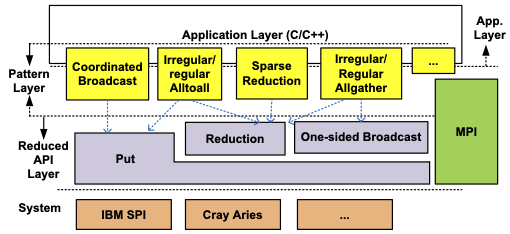Research
Researchers in the Performance and Algorithms Group are currently engaged in a wide variety of projects including collaborations with computer architects and programming models researchers. Below is a subset of our active research projects and topics.
ExaBiome
Exabiome project is developing exascale computing tools to solve previously infeasible science problems in genomic analysis. Read More »
Roofline Performance Model
Roofline is a visually intuitive performance model used to bound the performance of various numerical methods and operations running on multicore, manycore, or accelerator processor architectures. Read More »
RAPIDS2
RAPIDS2 SciDAC5 Institute assists Office of Science (SC) application teams in overcoming computer science, data, and AI challenges in the use of DOE supercomputing resources to achieve scientific breakthroughs. Read More »
Exagraph
ExaGraph Co-Design Center of the Department of Energy Exascale Computing Project (ECP) uses combinatorial kernels, with key examples being smart power grid, computational biology, computational chemistry, wind energy, and national security. Read More »
Scalable Graph Learning for Scientific Discovery
Scalable Graph Learning for Scientific Discovery targets graph representation learning (GRL). GRL is transforming scientific domains like structural biology, computational chemistry, particle physics, transportation, and program analysis. Read More »
Parallel Primitives for Randomized Algorithms on Sparse Data
Parallel Primitives for Randomized Algorithms on Sparse Data project targets scalable randomized methods broadly within the context of scientific data analysis. Read More »
ENDURABLE
The ENDURABLE project aims to provide the scientific community with tools to aggregate data robustly and train our deep learning models. Read More »
SciDAC-5 Institute
PAR researchers are engaged in performance modeling, machine learning, communication runtimes, and performance optimization research for applications in the Scientific Discovery through Advanced Computing (SciDAC) initiative. Read More »
SciDAC-5 SAP: Correlated Electrons in QM
This project aims at understanding, describing, and predicting the dynamics of the individual electronic states under non-equilibrium (NE) conditions. Read More »
SciDAC-5 SAP: DECODE
This project aims to harness exascale computing and non-conventional machine-learning approaches in order to design tailored optical excitations for controlling electron-driven dynamics in chemical/material systems using real-time time-dependent density functional theory (RT-TDDFT). Read More »
ECP PROTEAS-TUNE
ROTEAS-TUNE is a multi-institutional ECP software technology project spanning the topics of compilers, code generation, auto-tuning, and profiling. Read More »
Performance Analysis of AI Hardware and Software
Understanding the interplay between science, AI method, framework, and architecture is essential to quantifying the computational potential for current and future architectures running AI models and for identifying the bottlenecks and the ultimate limits of today's models. Read More »
High Performance Geometric Multigrid
High Performance Geometric Multigrid (HPGMG-FV) is a benchmark designed to proxy the finite volume based geometric multigrid linear solvers found in adaptive mesh refinement (AMR) based applications. Read More »
CSPACER
 CSPACER is a lightweight communication runtime for application-specific optimized communication patterns. It is composed of two layers. The lowest layer is a sub-microsecond communication layer that implements the consistent space abstraction primitives. On top of this layer is a communication pattern layer that is used as integration skeletons… Read More »
CSPACER is a lightweight communication runtime for application-specific optimized communication patterns. It is composed of two layers. The lowest layer is a sub-microsecond communication layer that implements the consistent space abstraction primitives. On top of this layer is a communication pattern layer that is used as integration skeletons… Read More »
Previous Projects
Over the last 10 years, researchers in the Performance and Algorithms research group have led a number of research projects spanning performance optimization, performance modeling, co-design, supercomputer benchmarking, and application of novel algorithms. Read More »









